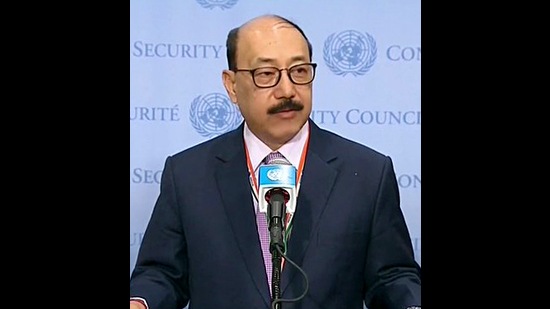Indian Ocean Region nations need cooperative architecture: Harsh Shringla
Harsh Shringla said the Covid-19 pandemic and new threats have highlighted the need to work together to forge common solutions, and India is ready to do its share to tackle these issues
Countries in the Indian Ocean Region (IOR) need a new cooperative architecture for their common maritime space to ensure both security and free trade, foreign secretary Harsh Shringla on Monday said.

The Covid-19 pandemic and new threats have highlighted the need to work together to forge common solutions, and India is ready to do its share to tackle these issues, he said, while addressing the Goa Maritime Conclave on the theme “Maritime security and emerging non-traditional threats: A case for proactive role for IOR navies”.
Defence secretary Ajay Kumar, who also addressed the event held in a hybrid format, raised the unprecedented expansion of conventional navies in the Pacific region, and said this is prompting a “new genre of arms race” whose effects are being felt far beyond the region. Though he didn’t name any country, his remarks were an apparent reference to China.
Shringla noted that the prosperity and well-being of people of countries in the region are built on a foundation of law and order and security, and said: “A new cooperative architecture for our common maritime space that ensures security for its inhabitants, driven by our realities, and our aspirations to lead better lives, is necessary to grasp this opportunity.”
While security in the context of foreign policy was traditionally associated with countering external security threats, countries in the region now have to contend with non-traditional and sub-conventional threats that require new solutions, he said.
“We now operate on the basis of an expanded concept of human security that takes a broader view,” he said.
Navies, coast guard forces, and maritime security agencies of the region need to do more together since all problems that will arise cannot be anticipated, he said. “India stands ready and willing to do its share – and more – in tackling these problems.”
The IOR countries can work on strengthening structures, understandings, procedures and resources so that they can better manage problems. “It will also enable us to create a ‘surge’ capacity to deal with the unknown,” he said.
The pandemic has led to a rebalancing that resulted in a dispersal of capacities, including for Indian Ocean nations. “Every one of us present here have a growing ability to come up with common solutions to common problems. That means we are able to do more together,” he said.
Many of the cooperative activities are in the areas of policing and law-enforcement, and more appropriate to the “newer and rapidly evolving threat matrix”, he noted. Among the non-traditional and sub-conventional problems listed by Shringla were transnational crime syndicates engaged in human trafficking, smuggling and narcotics, irresponsible fishing that damages food security, maritime accidents that lead to pollution, and natural disasters that affect coastal economic and population centres.
Coastal population centres, Shringla noted, are also “targets for terrorists, supported and encouraged by the resources of governments”.
In an apparent reference to China’s aggressive maritime activities, especially in the South China Sea, he said: “Another set of challenges arises from geopolitical volatilities. A lack of commitment to settled international law has led to an increased militarisation of the region. Militarisation always adds to complexities.”
Defence secretary made a special reference to illegal, unreported and unregulated (IUU) fishing in international waters off India’s coast – something that Chinese boats have been accused of – and called for action against the practice.
“While we talk of non-traditional threats, we cannot ignore the impact of expansion at unprecedented speed of conventional navies in the Pacific. We are also witnessing enhancement of certain maritime presence in passages in our region which do not always seem innocent,” Kumar told the gathering that included the Indian Navy chief Admiral Karambir Singh.
“The negative effects of such expansion are felt beyond the Pacific. Though it is early to conclude, such expansion has triggered others to acquire traditional capabilities and thus to start a new genre of arms race,” he said.
The third edition of the Goa Maritime Conclave is being held under the aegis of the Naval War College in Goa. The event was joined by senior officials of 12 Indian Ocean countries, including Bangladesh, Indonesia, Thailand, the Maldives, Myanmar, Singapore and Sri Lanka.






